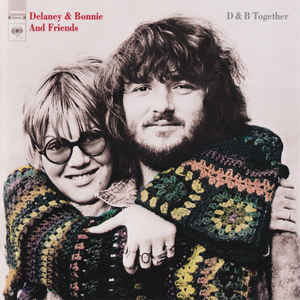V2.58
They had lots of famous friends who would stop by and play sessions, folks like Eric Clapton, Leon Russell, Rita Coolidge, Duane Allman, Tina Turner, and many others. They scored a couple of early ‘70s radio hits with “Never Ending Song of Love” and “Only You Know and I Know,” yet many critics and rock historians treat Delaney and Bonnie Bramlett as meaningless footnotes, mere asterisks next to the names of their better-known friends.
Truth is, the short-lived entity known as Delaney & Bonnie and Friends was not only a major influence on Clapton’s work in the ‘70s, but also upon the music of Russell, Coolidge, Turner, and Joe Cocker through the decade. Bonnie Bramlett’s gritty, soulful vocals rival those of her contemporary Janis Joplin for power and emotion. Delaney’s skill as a bandleader and eye for talented musicians is vastly underrated, many of the duo’s “friends” later comprising bands for Joe Cocker’s “Mad Dogs & Englishmen” tour as well as Clapton’s Derek & the Dominoes and George Harrison’s band. Delaney managed to slide egos to the side and coax excellent performances from his “friends” over the course of six influential albums.
The duo’s final album, D & B Together (Legacy Recordings), recently reissued with bonus cuts, is fairly representative of D & B’s creative milieu. A spirited blend of soul, gospel, blues, roots-rock, and Southern-fried grooves, D & B Together yielded a Top Twenty hit in Dave Mason’s infectious “Only You Know and I Know” and provided both Rita Coolidge and the Carpenters with respective hits in “Groupie (Superstar).” A collection of original material and songs contributed by friends like Mason, Clapton, Steve Cropper, and Bobby Whitlock, D & B Together is as fine an example of blue-eyed soul as the ‘70s would create, a time when genre-mixing and wearing your influences on your sleeve was not “verboten.”
As their marriage disintegrated, so too did Delaney & Bonnie’s musical collaboration, the pair splitting off into respective solo careers, a glimpse of which is provided at the end of D & B Together. Of the bonus tracks provided here, four are taken from a pair of Delaney solo projects from 1972 and ’73, showing the bandleader traveling much the same direction as did D&B and Friends, cranking out high-energy Southern funk and soulful ballads. The two tracks culled from Bonnie’s 1972 solo album Sweet Bonnie Bramlett only hint at the power of her voice, pairing Gospel-tinged arrangements with unfortunately muted vocals. Bonnie would go on to record several excellent albums for the Capricorn label, forging a career as a backing vocalist for a veritable “who’s who” of rock music. As shown by D & B Together, however, for a brief time Delaney and Bonnie Bramlett helped define popular music, setting the course for others to follow.
The full effect of Lucinda Williams’ music on the country and rock genres has yet to be fully charted, especially when the alt-country goddess continues to release albums as raw, revealing and powerful as World Without Tears (Lost Highway Records). While a lot of Williams’ past work has focused on love and lust, romance and relationships, never before has she delivered an album so seemingly obsessed with the sweet and bittersweet aspects of romance
World Without Tears is, on the surface, an elegant collection of folkish country songs with elements of rock and blues, guitarist Doug Pettibone adding an edge to the material with his excellent six-string work. Paired with a weeping country lilt, “Three Days” vividly retells the passion and abandonment of an intense love affair while “Ventura” accurately portrays the melancholy that follows a lost love, wonderfully supported by a mournful pedal steel guitar. With sparse instrumentation and a reliance on Williams’ provocative vocals, “Sweet Side” mimics the talking blues of early Bob Dylan, which were influenced, in turn, by the Delta folk bluesmen that Williams also listened to in her youth.
There are moments on World Without Tears that rock pretty hard, too, such as the Stones-inspired country honk of “Real Live Bleeding Fingers and Broken Guitar Strings,” a story of romantic obsession from afar. “Atonement” rocks like Howlin’ Wolf moaning at the moonlight, Williams’ dirgelike vocals paired with a martial rhythm and brilliant apocalyptic imagery. Pettibone’s guitar licks are razor-sharp on “Atonement,” Williams sounding like Patti Smith at her most powerful. The hauntingly beautiful “Minneapolis” may be the saddest tune on the album, Williams’ eerie, trembling vocals supported by a chiming guitar in the distance.
World Without Tears is a masterpiece of songwriting and musical composition, Williams’ poetic songs perfectly paired with appropriate supporting music. Long-time fans may be shocked at the intensity of Williams’ lyrics, stark portraits of love and betrayal that rise above the mundane level of contemporary pop songwriting. It is the goal of the artist, however, to follow their muse and to forever strive to grow and mature in their work. With World Without Tears, Lucinda Williams has not only surpassed her previous (excellent) work but she has also delivered an album that will continue to influence romantic songwriters for a generation to follow. (View From The Hill, 2003)



No comments:
Post a Comment